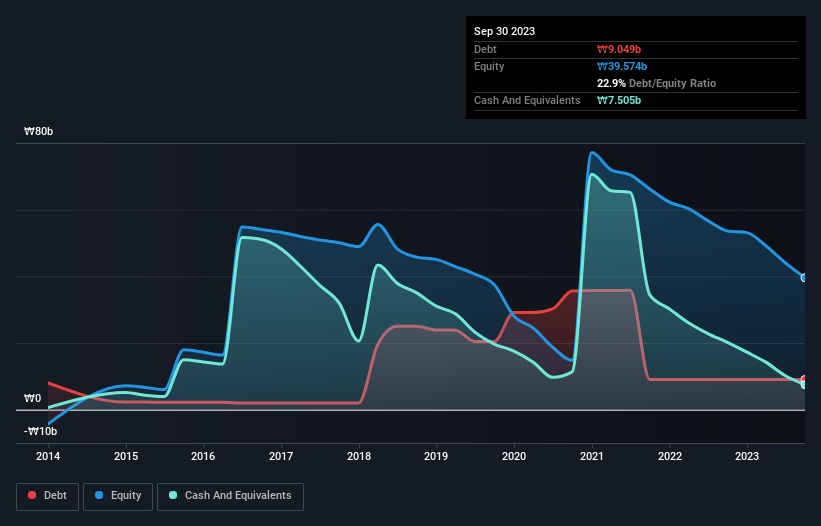
Legendary fund manager Li Lu (who Charlie Munger backed) once said, 'The biggest investment risk is not the volatility of prices, but whether you will suffer a permanent loss of capital.' So it seems the smart money knows that debt - which is usually involved in bankruptcies - is a very important factor, when you assess how risky a company is. As with many other companies Peptron, Inc. (KOSDAQ:087010) makes use of debt. But should shareholders be worried about its use of debt?
When Is Debt Dangerous?
Debt assists a business until the business has trouble paying it off, either with new capital or with free cash flow. In the worst case scenario, a company can go bankrupt if it cannot pay its creditors. However, a more common (but still painful) scenario is that it has to raise new equity capital at a low price, thus permanently diluting shareholders. Of course, the upside of debt is that it often represents cheap capital, especially when it replaces dilution in a company with the ability to reinvest at high rates of return. The first step when considering a company's debt levels is to consider its cash and debt together.
See our latest analysis for Peptron
What Is Peptron's Debt?
The chart below, which you can click on for greater detail, shows that Peptron had ₩9.05b in debt in September 2023; about the same as the year before. However, because it has a cash reserve of ₩7.51b, its net debt is less, at about ₩1.54b.

How Strong Is Peptron's Balance Sheet?
Zooming in on the latest balance sheet data, we can see that Peptron had liabilities of ₩10.7b due within 12 months and liabilities of ₩4.58b due beyond that. Offsetting these obligations, it had cash of ₩7.51b as well as receivables valued at ₩1.88b due within 12 months. So its liabilities total ₩5.89b more than the combination of its cash and short-term receivables.
Having regard to Peptron's size, it seems that its liquid assets are well balanced with its total liabilities. So it's very unlikely that the ₩605.4b company is short on cash, but still worth keeping an eye on the balance sheet. Carrying virtually no net debt, Peptron has a very light debt load indeed. The balance sheet is clearly the area to focus on when you are analysing debt. But you can't view debt in total isolation; since Peptron will need earnings to service that debt. So when considering debt, it's definitely worth looking at the earnings trend. Click here for an interactive snapshot.
In the last year Peptron had a loss before interest and tax, and actually shrunk its revenue by 43%, to ₩3.3b. That makes us nervous, to say the least.
Caveat Emptor
While Peptron's falling revenue is about as heartwarming as a wet blanket, arguably its earnings before interest and tax (EBIT) loss is even less appealing. To be specific the EBIT loss came in at ₩18b. When we look at that and recall the liabilities on its balance sheet, relative to cash, it seems unwise to us for the company to have any debt. Quite frankly we think the balance sheet is far from match-fit, although it could be improved with time. However, it doesn't help that it burned through ₩13b of cash over the last year. So to be blunt we think it is risky. The balance sheet is clearly the area to focus on when you are analysing debt. But ultimately, every company can contain risks that exist outside of the balance sheet. For example, we've discovered 4 warning signs for Peptron (3 shouldn't be ignored!) that you should be aware of before investing here.
Of course, if you're the type of investor who prefers buying stocks without the burden of debt, then don't hesitate to discover our exclusive list of net cash growth stocks, today.
New: Manage All Your Stock Portfolios in One Place
We've created the ultimate portfolio companion for stock investors, and it's free.
• Connect an unlimited number of Portfolios and see your total in one currency
• Be alerted to new Warning Signs or Risks via email or mobile
• Track the Fair Value of your stocks
Have feedback on this article? Concerned about the content? Get in touch with us directly. Alternatively, email editorial-team (at) simplywallst.com.
This article by Simply Wall St is general in nature. We provide commentary based on historical data and analyst forecasts only using an unbiased methodology and our articles are not intended to be financial advice. It does not constitute a recommendation to buy or sell any stock, and does not take account of your objectives, or your financial situation. We aim to bring you long-term focused analysis driven by fundamental data. Note that our analysis may not factor in the latest price-sensitive company announcements or qualitative material. Simply Wall St has no position in any stocks mentioned.
About KOSDAQ:A087010
Adequate balance sheet low.
Similar Companies
Market Insights
Community Narratives




